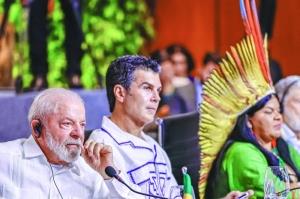(MENAFN- Gulf Times) Brazilian President Luiz Inacio Lula da Silva opened what he called a“landmark” summit yesterday, urging fellow South American leaders to chart an ambitious roadmap to save the Amazon rainforest.
Lula vowed bold action to stop the destruction of the world's biggest rainforest at the two-day meeting of the Amazon Co-operation Treaty Organisation (ACTO) in the northern city of Belem, at the mouth of the Amazon river.
“This is a landmark meeting. It will mark a turning point in the history of protecting the Amazon,” the veteran leftist said before opening the gathering.
It is the first summit in 14 years for the eight-nation group, set up in 1995 by the South American countries that share the Amazon basin: Bolivia, Brazil, Colombia, Ecuador, Guyana, Peru, Suriname and Venezuela.
Home to an estimated 10% of Earth's biodiversity, 50mn people and hundreds of billions of trees, the vast Amazon is a vital carbon sink, reducing global warming.
However, scientists warn the destruction of the rainforest is pushing it dangerously close to a“tipping point”, beyond which trees would die off and release carbon rather than absorb it, with catastrophic consequences for the climate.
The summit opened the same day the European Union's climate observatory confirmed July was the hottest month ever recorded on Earth, in a new warning of the climate's fragility.
In his opening speech, Lula emphasised the“severe worsening of the climate crisis”.
“The challenges of our era, and the opportunities arising from them, demand we act in unison,” he said.“It has never been so urgent.”
ACTO secretary-general Alexandra Moreira said that the summit would produce a joint declaration setting out“energetic, bold” actions to protect the rainforest.
Deforestation in the Amazon is driven mainly by cattle ranching, though it is also fuelled by a murky mix of corruption, land-grabbing and organised crime whose tentacles extend to illegal trafficking of drugs, arms, timber and gold.
In Brazil, the world's top exporter of beef and soy and home to more than 60% of the Amazon, the destruction has already wiped out around one-fifth of the rainforest.
Environmental groups are pressuring all eight countries to adopt Brazil's pledge to eradicate illegal deforestation by 2030, though Brazilian officials indicated those negotiations may need more time.
Colombian President Gustavo Petro is meanwhile pushing other countries to adhere to his pledge to ban all new oil exploration – a touchy subject for oil-rich Venezuela and also Brazil, whose state-run oil company, Petrobras, is controversially seeking to explore new offshore blocs at the mouth of the Amazon river itself.
Colombian Environment Minister Susana Mohamed for her part called for the summit's final declaration to include a goal of preserving 80% of the Amazon by 2025, in line with Indigenous groups' demands.
Brazil is also calling for the summit to create an international police task force for the region and a scientific research group modelled on the Intergovernmental Panel on Climate Change (IPCC), the advisory board to the UN climate talks.
The summit is also something of a dress rehearsal for the 2025 UN climate talks, which Belem will host.
Lula, Petro, Bolivian President Luis Arce, and Peru's Dina Boluarte were all present for the summit.
Venezuelan President Nicolas Maduro, absent due to an ear infection, sent Vice-President Delcy Rodriguez, while Ecuador, Guyana and Surinam were represented by high-level officials.
The summit is a key test for Lula, who previously served as president from 2003 to 2010 and returned to office in January vowing“Brazil is back” in the fight against climate change, after four years of surging destruction in the Amazon under his far-right predecessor, Jair Bolsonaro.
The summit“should deliver concrete results if the region is serious about becoming a leader in climate action”, said US-based activist group Avaaz.
Indigenous groups – whose protected reservations are crucial buffers against the destruction of the world's forests, according to experts – urged South American leaders to take decisive action.
“The presidents here and around the world need to hear us,” said iconic Brazilian Indigenous chief Raoni.“If they don't stop deforestation, we're going to face far bigger problems.”
Bolivian President Arce highlighted the threat of deforestation in his speech.
“Ancient forests are being devastated at an accelerated pace,” he said.“Hundred-year-old trees are being felled without planning or consideration. This is one of the biggest problems the Amazon has faced.”
Amazon countries will meet leaders of the Democratic Republic of the Congo and Indonesia today, looking to issue a joint statement from the world's three major rainforest basins.
Norway and Germany, which have funded Amazon preservation, and France, which controls the Amazon territory of French Guiana, will also participate.
MENAFN08082023000067011011ID1106814424
Legal Disclaimer:
MENAFN provides the
information “as is” without warranty of any kind. We do not accept
any responsibility or liability for the accuracy, content, images,
videos, licenses, completeness, legality, or reliability of the information
contained in this article. If you have any complaints or copyright
issues related to this article, kindly contact the provider above.



















Comments
No comment